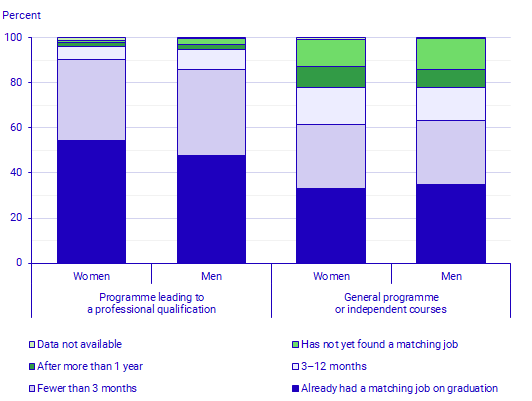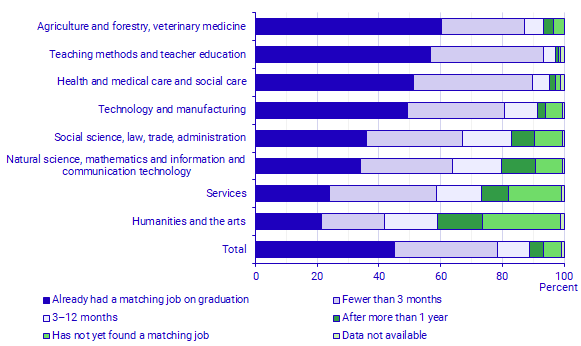Entry into the labour market among people who completed higher education in 2017/18
Statistical news from Statistics Sweden 2021-11-16 9.30
Most graduates of higher education in 2017/18 quickly found a job that for the most part matched their higher education studies. Graduates from programmes leading to a professional qualification found a matching job quickest: half of them found a job already before they graduated. Three years after graduating from higher education, 9 in 10 had work as their main activity
These statistics are based on a report produced by Statistics Sweden on the entry into the labour market among people who completed higher education in academic year 2017/18.
Some of the results included in the report show that
- Graduates from programmes leading to a professional qualification quickly found a job that matched their education.
- Finding the first matching job took the longest time for graduates from the humanities and the arts.
- It took longer time for foreign born persons than for persons born in Sweden to find their first matching job.
- Eight in ten people who studied Teaching methods and teacher education have an increased workload due to the pandemic.
Graduates from programmes leading to a professional qualification quickly find a job that matches their education
In total, three in four people had a job that to a large extent matched their higher education studies within three months after their education. Graduates had matching jobs to a larger extent than people without a qualification. The percentage was higher among graduates from programmes leading to a professional qualification than among people with a general degree.
Women with a professional qualification found a job that matched their education quicker after graduation than men with a professional qualification. This gender gap is less clear between women and men with a general degree.
Higher education students who completed their studies in 2017/18 with a qualification

Longer time for foreign born persons to find first matching job
Among persons born in Sweden, 46 percent had a job that to a large extent matched their education before they completed their studies. The corresponding proportion among foreign born persons was 34 percent.
Foreign born persons in the population to a larger extent than persons born in Sweden studied in a general programme or independent courses. However, persons born in Sweden found a matching job quicker than foreign born persons did, within both degree categories.
Main specialisations that quickly lead to a matching job
The main specialisations that to a large extent led to a job that matched the education within three months are: Agriculture and forestry, veterinary medicine, Teaching methods and teacher training, and Health and medical care and social care. Among graduates from these programmes, around 90 percent found a matching job within three months.
The lowest proportion was noted among graduates from the specialisation Humanities and the arts, at 41 percent.
Higher education students who completed their studies in 2017/18 with a degree

Eight in ten students who studied teaching methods and teacher education have an increased workload due to the pandemic
Around two years after completing higher education studies in 2017/18, COVID-19 began to spread in Sweden and at the time of measurement, the COVID-19 pandemic had been ongoing for a year.
People who studied within the main specialisations Teaching methods and teacher education and Health and medical care and social care were affected by the pandemic to a large degree. They experienced to a larger degree than others that their working duties had worsened and their workload had increased due to the pandemic. There are differences between women and men in terms of the perception about worsened work duties and an increased workload, which is largely explained by the fact that more women than men studied these main specialisations.
Those who studied the main specialisation Teaching methods and teacher education answered to the largest extent that their workload had increased, at 78 percent. This was followed by those who studied Health and medical care and social care, at 66 percent. Among people who studied other programmes, the percentage of those whose workload had increased varied between around 30-45 percent.
People who studied a general programme or independent courses worked from home during the pandemic to a much larger extent than people who studied a professional qualification programme. These people were also to a higher degree very satisfied with working hours and the physical and mental working environment than those who studied a professional qualification programme.
Among people who studied a professional qualification programme and have worked during the pandemic, 48 percent fully or partly worked from home. The corresponding proportion among those who studied a general programme or independent courses is considerably higher, at 81 percent.
People who studied Teaching methods and teacher education have worked from home to the smallest extent, and women to a much smaller extent than men. This difference can largely be explained by the fact that it is more common among women to study to become a pre-school teacher - an occupation that does not offer the same opportunities for working from home.
Men, instead, studied to a larger extent as secondary school teachers with a focus on years 7-9 and upper secondary school. These types of schooling conducted remote or distance teaching during the COVID-19 pandemic.
Feel free to use the facts from this statistical news but remember to state Source: Statistics Sweden.
